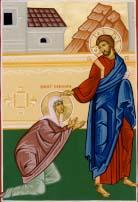Archives: Inclusion Via Exclusion

Having spent some time years ago in a UCC church, I was curious to learn of their new campaign 'God is still Speaking' in which they boast of their 'inclusion' of all. Part of their campaign includes a commercial which shows bouncers at a cathedral type church chasing away various folks (minorities, gays, etc.)and only allowing others (squeaky whites, etc.).
Then the UCCers come in and show how 'inclusive' their churches look, with gals holding hands and such, because 'God is still speaking.'
I contrast that with the description of Hippolytus, bishop of Rome around 225 A.D. He gives a manual on the training of Catechumens who want to join the church. A key phrase that is repeated is 'let them cease (meaning their pagan occupations and practices) or be rejected.' In other words, he describes a community that rehabilitates pagans in a three year process, complete with exclusion from the table during that time and even exorcism if necessary. If the potential convert refused to be a part of the rehab program, well, they were 'excluded' from the community.
Now pieces of what Hippolytus says is anachronistic but interestingly the church of his time grew like wildfire. The pagan rehab stuff seemed to work both in terms of evangelism and in terms of disciple-making. Is there something to learn here?
(PS, I'm not picking on the UCC, my experience with my own denomination is pretty much the same, witness the 'Via Media' evangelism curriculum.)











